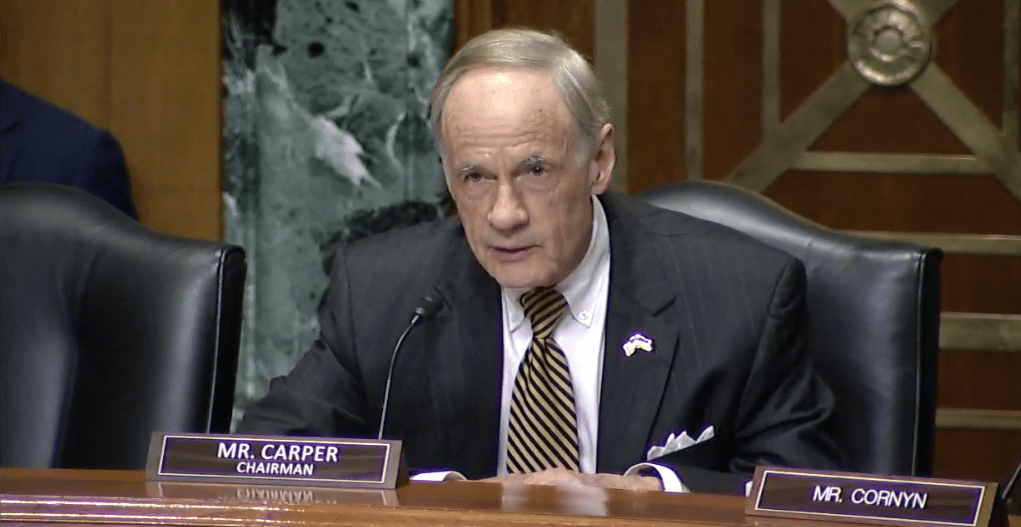A Senate hearing last week took shots at the de minimis trade provision, a rule that allows for up to $800 worth of goods to be imported to the U.S. from anywhere, duty-free. One witness representing de minimis import benefactors Amazon, Walmart, and FedEx, said there should be a moratorium on de minimis altogether for e-commerce sales.
 “I think a permanent moratorium on e-commerce duties is critical, especially to small business, because that is something that can definitely hurt, particularly if there was retaliation,” said Christine Bliss, president of the Coalition of Services Industries, a roughly five-year-old advocacy group backed by importers who benefit from de minims, including Disney and Ebay to the mix. [Download Testimony]
“I think a permanent moratorium on e-commerce duties is critical, especially to small business, because that is something that can definitely hurt, particularly if there was retaliation,” said Christine Bliss, president of the Coalition of Services Industries, a roughly five-year-old advocacy group backed by importers who benefit from de minims, including Disney and Ebay to the mix. [Download Testimony]
Bliss was one of four witnesses on November 30 who testified before the Senate Finance Committee’s Subcommittee on International Trade, Customs and Global Competitiveness. The hearing, titled “Opportunities and Challenges for Trade Policy in the Digital Economy”, was chaired by Senator Thomas Carper (D-DE) and Ranking Member John Cornyn (R-TX).
The hearing centered on digital trade and how it might play a role in the newly proposed Indo-Pacific Economic Framework, a group of 14 member countries focused on unifying policies across trade and building “resilient supply chains” as a counterweight to the existing China-centric supply chain relied on by most American corporations.
At one point at the end of the hearing, Senator Carper asked Patrick Woodall, a policy director for the AFL-CIO Technology Institute, where his group stood on digital trade issues, including e-commerce.
“I expected to be asked about the ephemera of digital commerce affecting real workers’ lives, and I think there’s a recognition that there are real challenges that workers face,” Woodall said. “We need to deal with digitization of commerce in a more worker-centered way going forward.”
The impact of de minimis on the U.S. economy is large and getting larger. CPA estimated this year that the value of de minimis imports into the U.S. was $128 billion in 2021, suggesting the actual trade deficit for 2021 was 15% higher than official figures show. Rising de minimis imports cost the U.S. hundreds of thousands of good-paying jobs and millions in domestic sales as the U.S. consumer has a direct to China e-commerce market available to them duty free. This means de minimis also hurts traditional bricks-and-mortar retail stores.
Government data on imports and the trade deficit is increasingly understated because the large and growing volume of imports from the de minimis program are not included in those data points. The packages are too small in value, and too numerous to count. The 2021 goods trade deficit was over $1 trillion, and will beat that again this year. CPA’s analysis shows there is likely $128 billion of imports missing from government data due to the de minimis provision Amazon and the like would prefer to be exempt from changes.
The risk of change to the de minimis provision is real.
Earl Blumenauer (D-OR), Chairman of the House Ways and Means Trade Subcommittee, introduced a bill this year called the Import Security and Fairness Act (H.R. 6412) that would prohibit merchandise from countries on the US Trade Representative’s Priority Watch list from benefiting from de minimis. China is on that list. The Blumenauer bill has been stuck in the House Subcommittee on Trade since January.
Customs officials have joked that de minimis is a free trade agreement with China.
CBP’s new report (CBP Publication No. 2036-1022) was the first time the Customs authority has ever reported an official value for de minimis imports.
Polls have shown that Americans support shrinking the de minimis loophole.
Poll: Voters Overwhelmingly Support Prohibiting China from Exploiting De Minimis Loophole













